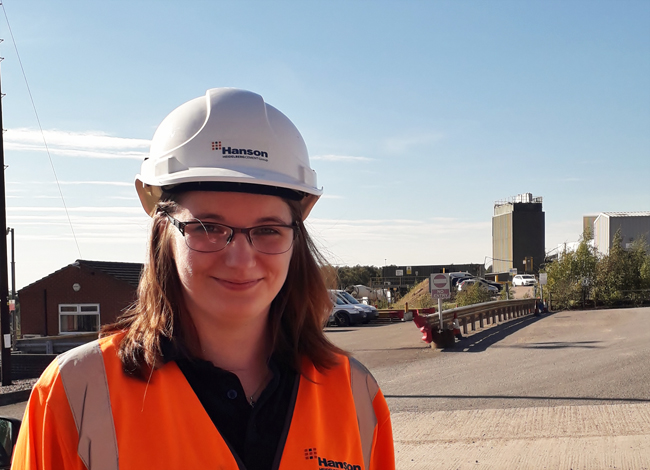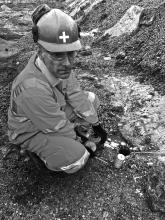
Designed for enthusiastic school leavers, Hanson UK’s Leadership, Education and Development (LEAD) higher management apprenticeship programme allows individuals to learn and develop supervisory skills in a hands-on building materials production environment. It offers the best of both worlds – earning while learning to be a future supervisor or manager. Guy Woodford spoke to four LEAD programme apprentices about their learning experiences.
As business deals go,
In the first three years of the LEAD programme apprentices gain hands-on experience and relevant qualifications in operational aspects of Hanson UK’s business, while completing a distance learning foundation degree at the University of Derby, which will eventually lead to an honours degree in mineral extractives management. Programme followers could become a trainee manager or plant supervisor by year four. LEAD apprentices will be allowed time for studies within normal working hours but must also study in their own time. They are supported throughout the programme by both a manager and mentor.
Hanson UK’s LEAD programme was established in 2011. As of December 2018, 39 LEAD trainees had either graduated or were on the programme. Recruitment for LEAD apprenticeships is managed by Cohesion, the early talent specialists.
Emily Burridge, 22, from Shepton Mallet, Somerset, is a concrete technical production manager who covers 25 concrete plants in the West Midlands region of England from her base at Weeford quarry, near Sutton Coldfield.
“I joined the Hanson LEAD programme three years ago and have spent time in all different parts of the business including human resources, finance, customer contact centre and within its cement, asphalt, aggregates and concrete divisions. I also spent two weeks at Whatley quarry near to where I grew up in Somerset. It is one of Europe’s largest limestone quarries and I got to load explosives for a blast and fly a drone to monitor stockpile levels.
“Although I’ve had a taste for all parts of the business, most of my time has been spent in technical concrete work. I’ve helped create Tremiecrete, a new concrete mix for Hanson UK, which was launched in early 2018. I conducted all the trials and it was exciting to be involved in every aspect of its development.”
With an F6 consistency and featuring a bespoke range of admixtures, Tremiecrete is designed for use in very difficult piling applications and with Tremie pipes. “We’ve had some clients using it in different jobs right across the UK,” explains Emily, who is spending the next two years juggling her Hanson UK management role with building on her July 2018-gained FSc (foundation degree) in Minerals Management from the University of Derby Mineral Products Centre to gain a BSc (honours degree) in Minerals Management.
So why did Emily want to pursue a career in the mineral products sector? “My family were very hands-on in their own careers. My dad was a mechanic and my grandparents were farmers. I always liked to be doing things rather than being sat behind a computer. I also wanted to be a manager, so with my current role at Hanson UK, I’ve got the best of both worlds.”
Elliot Wellbelove, 25, from Sleaford, Lincolnshire, is quarry environment manager at Hanson Cement’s Padeswood Works, near Mold, North Wales. He was part of the first-ever Hanson LEAD programme cohort that graduated in June 2018 with a BSc in Minerals Management from the University of Derby.
“I gained A-Levels in Maths, Physics and Engineering and wanted to go to university to study mechanical engineering until I saw an advert for the Hanson LEAD programme. I visited Hanson Cement’s Ketton Works in Rutland during my LEAD interview and was impressed with the scale of the production site. I thought it was an industry I wanted to work in after university and I liked the idea of learning while getting paid. I was offered a LEAD place and have never regretted it.
“The longer I’ve worked with Hanson, I’ve realised that experience is invaluable. I’ve a lot more than a university graduate looking to enter the industry, and no student debt. I’ve been lucky to have some experience abroad during my time on HeidelbergCement’s engineering training programme. As part of that I’ve been involved in a £25 million project to install a latest technology-equipped cement mill at Padeswood Cement Works. I spent ten weeks in Morocco analysing a similar set-up to the one we would like at Padeswood. The previous year I was involved in a renewable energy project and spent 12 weeks in Slite, Sweden, examining how a solar farm there might be replicated to power Padeswood and other Hanson sites.
“I’m also involved in the recruitment of the next Hanson LEAD programme cohort and visiting local schools in North Wales to discuss careers in the mineral products sector.”
Speaking about his role at Padeswood Works and future ambitions in the mineral products sector, Elliott said: “I was a process engineer and have been seconded to my current role as quarry environment manager. I’m responsible for the quality of all products and complying with environmental permit regulations around our handling waste fuels. I also monitor the site’s stack emissions online.”
James Kidd, 25, a kiln engineer at Hanson Cement’s Padeswood Works, got on to the LEAD programme after coming out of sixth form and securing a job at Hanson Cement’s Ribblesdale Works in Clitheroe, Lancashire, in September 2012.
“I was never driven at school by an ambition to get into engineering. I went with my secondary school to an open day at Ribblesdale Works and I thought it would be good to work there. “On the Hanson LEAD programme you do the academic as well as the practical side. There are opportunities to go to different sites. The programme encouraged me to mature and become self-sufficient as I had to leave home at 19. I compared myself to some of my friends that went to universities and I thought I was getting a far better experience of life. I don’t think I’ve missed out. When I started at Ribblesdale Works I was offered a decent wage for my age.
“Next year and the year after I will spend six months of each year at different sites to gain more experience. Eventually I would like to work in a senior operational or managerial role. I wouldn’t be averse to going abroad with my work.”
Daniel James, 26, is manager of Hanson Aggregates’ Penderyn quarry, near Aberdare, South Wales. “I finished my A levels and wanted to go into the RAF once I had finished at Sixth Form. Unfortunately, I was diagnosed with Type 1 Diabetes and the RAF was no longer an option for me. Soon after, I was discharged from hospital and bumped into someone I knew who recommended that I apply for the Hanson apprenticeship.
“I was in the first cohort of apprentices into the scheme and was very interested in the ‘earn while you learn’ side of an apprenticeship. I did the three-year [Minerals Management] foundation degree course at the University of Derby’s Mineral Products Centre and earned [from Hanson Aggregates work] £15,000 per year in the first year, £17,000 in the second and £19,000 in the third year. After the foundation year, I went on to do a further two-year course to get me my [BSc] honours degree [in Minerals Management]. This was a similar course to the foundation level and I was already working a full-time role, so I had to manage my studies and work.
“Two-and-a-half years into the course I became a general foreman [at a Hanson Aggregates site] in Oxford, and that was a role I stayed in for 18 months. I have recently started as a quarry manager and moved back to Wales. My day-to-day role includes ensuring the site is running, health and safety at the site, overseeing the direction the quarry is going in.
“Thanks to the LEAD programme I knew that I was going to get a senior management role as they had invested money into training us. The training has been fantastic and has allowed amazing development within the company. I want to go as high as I can within Hanson.”










